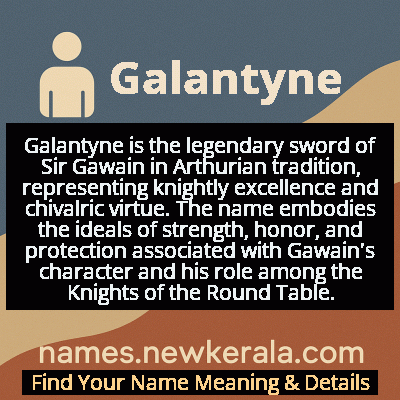Galantyne Name Meaning & Details
Origin, Popularity, Numerology Analysis & Name Meaning of Galantyne
Discover the origin, meaning, and cultural significance of the name GALANTYNE. Delve into its historical roots and explore the lasting impact it has had on communities and traditions.
Name
Galantyne
Gender
Male
Origin
Arthurian
Lucky Number
9
Meaning of the Name - Galantyne
Galantyne is the legendary sword of Sir Gawain in Arthurian tradition, representing knightly excellence and chivalric virtue. The name embodies the ideals of strength, honor, and protection associated with Gawain's character and his role among the Knights of the Round Table.
Galantyne - Complete Numerology Analysis
Your Numerology Number
Based on Pythagorean Numerology System
Ruling Planet
Mars
Positive Nature
Generous, passionate, energetic, and humanitarian.
Negative Traits
Impulsive, impatient, moody, and can be overly emotional.
Lucky Colours
Red, maroon, scarlet.
Lucky Days
Tuesday.
Lucky Stones
Red coral, garnet.
Harmony Numbers
1, 2, 3, 6.
Best Suited Professions
Military, sports, philanthropy, leadership roles.
What People Like About You
Courage, energy, leadership, generosity.
Famous People Named Galantyne
Sir Gawain
Arthurian Knight
Legendary wielder of Galantyne and model of chivalric virtue in Arthurian romance
Thomas Malory
Author
Included Galantyne in Le Morte d'Arthur, cementing its place in Arthurian canon
Chrétien de Troyes
Poet
Developed Gawain's character and established the tradition of his legendary weaponry
Name Variations & International Equivalents
Click on blue names to explore their detailed meanings. Gray names with will be available soon.
Cultural & Historical Significance
The cultural significance of Galantyne extends beyond its literary appearances to represent the entire ethos of Arthurian knighthood. As Gawain's character evolves from the early Welsh tales of Gwalchmei to the sophisticated knight of French romance, his sword similarly transforms from a simple weapon to a symbol of perfected chivalry. The sword's presence in stories like Gawain's battles and quests underscores the medieval belief that a true knight's worth was measured not just by his fighting skill but by how he wielded his power—with justice, mercy, and honor. This made Galantyne an important cultural artifact representing the ideal balance between strength and virtue that defined the Arthurian golden age.
Extended Personality Analysis
Those associated with the name Galantyne typically exhibit a powerful combination of strength, honor, and strategic intelligence. They embody the chivalric virtues of courage, loyalty, and unwavering commitment to their principles, much like Sir Gawain in his Arthurian adventures. These individuals often possess natural leadership qualities and inspire trust through their consistent moral compass and reliability in challenging situations. They tend to be protective of others, particularly the vulnerable, and approach conflicts with a blend of diplomatic skill and resolute action when necessary. Their strength is typically tempered by wisdom and a deep understanding of responsibility.
Beyond these core traits, Galantyne-associated personalities often demonstrate remarkable resilience and the ability to learn from adversity. They may struggle with the tension between personal desires and duty, reflecting Gawain's own complex character development throughout Arthurian literature. These individuals usually value tradition and honor but are not inflexible—they possess the wisdom to understand when principles must be adapted to complex real-world situations. Their journey often involves mastering the balance between power and restraint, learning that true strength lies in knowing when to act and when to show mercy. This makes them respected figures who command authority through both capability and character.
Modern Usage & Popularity
In contemporary contexts, Galantyne remains predominantly within the realm of literary reference, historical study, and fantasy culture rather than common given name usage. The name appears regularly in Arthurian scholarship, medieval studies, and adaptations of the legends in various media. It has found a niche in fantasy literature, role-playing games, and historical reenactment communities where its Arthurian connections are valued. While extremely rare as a personal name, it occasionally surfaces in creative works as a character name or for magical artifacts, capitalizing on its legendary associations with knightly virtue and power. The name's usage reflects a continued fascination with Arthurian ideals in modern culture, serving as a bridge between contemporary fantasy interests and medieval literary heritage.
Symbolic & Spiritual Meanings
Galantyne carries profound symbolic weight as the embodiment of perfected knighthood and the integration of martial power with moral virtue. The sword represents the ideal that true strength must be guided by ethical principles and used in service of justice rather than personal ambition. Symbolically, it stands for protection, honor, and the knight's sacred duty to defend the weak and uphold righteousness. The weapon also signifies personal transformation—the process through which raw potential is refined into noble character through discipline, experience, and moral development. As Gawain's companion through his adventures, Galantyne symbolizes the constant testing and reaffirmation of chivalric values in a complex world.

